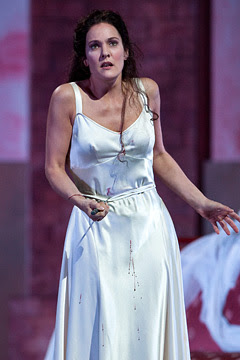 Gina Galati
Gina GalatiBy Liam Otten, Senior News Writer, Washington University
RecordOver the last two decades
Jolly Stewart has been a force in St. Louis opera. In addition to directing Washington University Opera, which she founded with her husband, John, Stewart serves as principal stage director for Union Avenue Opera and coordinates Opera Theatre St. Louis' Spring Training Program for talented high school singers.
In March, the Washington University Opera will celebrate Stewart's upcoming retirement with an "all-star" performance of
Die Fledermaus (1874), the beloved operetta by Johann Strauss II (1825-99). The production will feature nine returning alumni -- all of whom now sing professionally -- as well as celebrated baritone Ian Greenlaw, teacher of applied music in Arts & Sciences.
Performances begin at 8 p.m. Friday and Saturday, March 19 and 20. Tickets are $18; $12 for seniors and Washington University faculty and staff; and $7 for students. Edison Theatre is located in the Mallinckrodt Center, 6445 Forsyth Boulevard.
For more information, call (314) 935-5566 or email kschultz@artsci.wustl.edu.
"Last hurrah"Prior to settling in St. Louis, both Stewarts enjoyed distinguished singing careers. Jolly, a Kansas City native, had appeared with Austria's Salzburg Camerata and the San Francisco Opera, among many others, while John’s extensive credits included Santa Fe Opera, Metropolitan Opera and the New York City Opera.
Yet in 1990, when they arrived in the Department of Music in Arts & Sciences -- Jolly as a teacher of applied music, John as director of vocal activities -- the university did not have an opera company. They decided to start one.
"We thought, 'this place needs to do opera,'" Jolly says with a laugh. "We started small and just grew from there."
The itinerant company -- which each year would consist of the 15-20 students in Jolly’s opera class -- staged its first production, of Leonard Bernstein’s
Trouble in Tahiti (1952), in the modest ballroom of the 560 Music Building. Subsequent seasons would see performances in the Sheldon Theatre, Graham Chapel, Bixby Gallery, the Saint Louis Art Museum and finally Edison Theatre, where they’ve been for the last six seasons.
"For the most part, we’ve focused on 20th century opera," Jolly points out, noting recent productions of Jack Beeson’s
Lizzie Borden (1965), Benjamin Britten’s
Albert Herring (1947) and Carlisle Floyd's
Of Mice and Men (1970). "I’ve seen it as a mission to do works that audiences don’t get to see everyday -- and to give students a chance to learn things that will really stretch them."
On the other hand, "for this 'last hurrah,' we wanted to do something familiar and fun," she adds. "And of course we now have the luxury of drawing on so many professional singers."
Die Fledermaus (The Bat)Set in glittering, fin de siècle Vienna,
Die Fledermaus is a light-hearted revenge comedy centering on Gabriel von Eisenstein, a fast-living (if inconveniently married) man-of-means, who has just received a short prison sentence for abusing a police officer. Falke, Eisenstein’s friend, invites him to spend a last night of freedom at Prince Orlofsky’s masked ball, promising that, "all the ladies of the ballet will be there."
Meanwhile, Eisenstein's wife, Rosalinde, takes advantage of his absence to meet with Alfred, her own would-be lover. Things go awry with the arrival of Herr Frank, the prison governor, who, mistaking Alfred for Rosalinde’s husband, carts him off to jail. Further complications ensue when Eisenstein arrives at the ball -- which, it turns out, has been arranged as a practical joke at his expense.
"Once, returning home from a similar ball, Eisenstein abandoned Falke, drunk, on a park bench," Stewart explains. "The next morning he was found, wearing the costume of a bat, by a policeman, earning the ridicule of all Vienna.
"To get back at him, Falke plans Orlofsky’s ball and invites all the strategic people in Eisenstein’s life, including Rosalinde, who comes disguised as a Hungarian countess," Stewart continues. Thus Eisenstein, "who prides himself on being able to charm any woman,” begins the unintended seduction of his own wife.
"It’s saucy and flirtatious and a lot of fun," Stewart concludes. "Everybody loves champagne just a bit too much."
Cast and crew
The cast of 10 is led by tenor Clark Sturdevant, currently an artist-in-residence with Dayton Opera, as Eisenstein; and soprano Gina Galati, founder of St. Louis' Winter Opera, as Rosalinde. Also starring are Greenlaw as Falke; tenor Adam Cromer as Alfred; and Elise LaBarge as Adele, Rosalinde’s maid.
Rounding out the cast are Megan Higgins as Sally, Adele’s sister; Nathan Ruggles as Herr Frank; Debra Hillabrand as Orlofsky; and Philip Touchette as the prince’s valet. Tenor James Harr pulls double-duty as both Eisenstein's attorney, Blind, and his jailer, Frosch.
Jolly Stewart directs the performance, and John Stewart conducts. Sets and lighting are by Patrick Huber, a longtime collaborator who has worked with Jolly on dozens of shows, both for Washington University Opera and Union Avenue Opera. Costumes are by another longtime collaborator, Teresa Doggett.
 Gina Galati
Gina Galati






